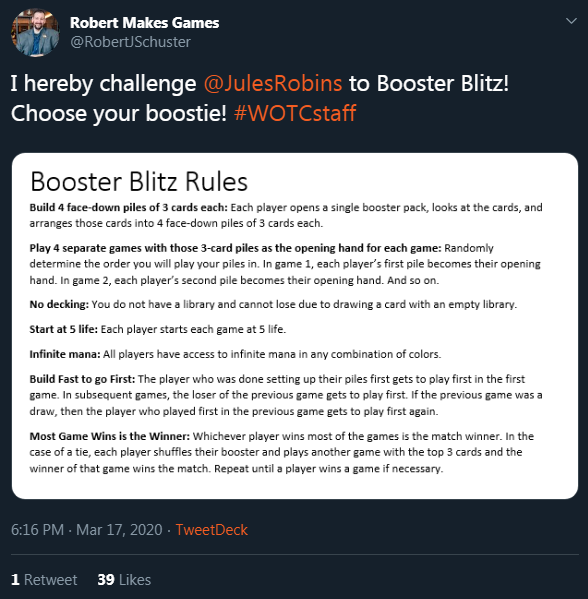As we adjust to the current lockdown in place to beat the pandemic, Scott brings us his ideas for how to enjoy Magic without the Gathering while we’re social distancing. With this, his second article, we’d like to officially welcome him to the team here at Hipsters!
We are currently living in a strange reality. We can’t see our friends or family as much as we’d like to, a pack of toilet paper is going for about as much as an Alpha Black Lotus, and being a responsible adult involves spending our days watching Netflix in our pajamas. There are a lot of big things that are worrying or upsetting people, and our collective mental health may be dropping. While this is all for the greater good, it still sucks—we can’t even go to our LGS and jam a few games to help us chill out.
Which brings me to this article! I’ve created a list of different Magic related things we can do when our favorite hobby has become Magic: the Distancing.
Organize Your Collection
“A cluttered desk is a cluttered mind”
Let’s be honest, we’ve all been meaning to do it for some time, and I’m no exception. I’ve got piles of cards forming a paper cityscape on my desk, from failed brews to postponed deck builds, and they’re only getting taller. Like a true Izzet mage, I regularly tell myself there’s method to the madness and that I know where any given card is; but after failing to find a Fiery Islet for two hours last week, I know I have no excuse.

Now is the time to grab this bull by the horns and finally put some order in place. No matter the size of your collection, there’s always merit in knowing how to find what you need as quickly and efficiently as possible. There are many different ways by which you can sort you collection:
- Alphabetically
- Color
- Converted mana cost
- Set symbol
- Rarity
- A combination of the above
I used to sort by format legality first (all Modern legal cards in one box, Standard in another, etc), then by color, and finally alphabetically. This archive, devoid of chaos, didn’t feel right to me. I now just sort by color, but it’s down to you what order looks like for your collection (Editor: I like to keep stuff sorted into binders, with an overflow box in one of the old Gift Boxes!)
There are several YouTube videos and countless Reddit threads and forum posts that discuss different ways you can organize, so you won’t be short of ideas. I recommend the Professor’s video above as a good place to start. When you’re done, you’ll probably find yourself with a sizable amount of cards you don’t really need. In that, case, why not…
Help the kids!
What better way to make your massive collection more manageable than to donate some to great causes? Magic cards are used by several institutions and charities to help kids learn and become proficient with mathematics, reading, critical thinking, and social interaction. MagiKids is a great charity in North America (you can usually see one of their stands at MagicFests), but there are many other places that would be ecstatic to take your draft chaff off your hands; a local school or community centre likely has a board game club that would jump at the chance.
Be sure to call ahead before donating anywhere though—as we’re practicing social distancing you’ll likely have to make a contactless dropoff. If they’re closed for now you can keep the delivery safe to one side for when they reopen.
Online Booster Blitz
Booster Blitz, also known as Pai Gow Magic or Juggernaut, is usually a great way to pass a few minutes between games. It’s also a way to feel okay about cracking packs for no value. The rules are very simple:
- Each player opens a booster pack, looks at the cards, and puts them into 5 face-down piles of 3 cards each.
- Whoever does their piles first gets to be on the play in game 1.
- You then play 5 separate games of Magic, with each pile being a different game.
- Whoever goes first gets to pick one of their opponent’s piles for them to play with—that pile is the opponent’s opening hand. The person on the draw then does the same for the person on the play.
- The rules for these games are slightly different to normal games of magic, though:
- Each player starts at 5 life
- You have infinite mana of all colors
- There are no libraries, and you can’t lose to decking
- The format is best 3 out of 5 games, or in the case of multiple draws—whoever wins the most.
Usually this would be played at the tables of an LGS or MagicFest, but as these have been shut down for the time being we’ve got to adapt. Thankfully, there is an extremely popular platform that’s perfectly suited to such a compact game: Twitter!
Here’s WotC’s own Robert Schuster with a perfect example of how to play Booster Blitz with a friend over Twitter—simply show the pack you choose, show your face-down piles, and play out the games through a short thread! It’s great for reaching out beyond our usual smaller circles, or just injecting a bit of enjoyment into someone’s day.
But what if you don’t have any packs lying around, or if brewing is more your thing?
Build a Micro Cube
We all know that feeling—sometimes you just need that little bit of paper Magic to scratch that itch. If you’re lucky enough to be isolating with others during this period of social distancing, you might have been able to grab them for a couple games already. If they don’t want to sit down for either a two hour game of commander or to watch you goldfish Storm, though, then I might have the solution for you.
A micro cube is more of a specific environment than a format, and it’s one I designed to create the optimal Booster Blitz experience. A typical micro cube is sixty cards in size (but with no lands), so you can fit it all into a single deck box. I’m not trying to convince you to build an actual cube; a micro cube is a much more achievable endeavour. I will say, however, I will admit now is as good a time as any to consider building one!
Back to micro cube, though: shuffle the cube, deal out one “booster” (15 cards) to each player, then you’re ready to play Booster Blitz with each other.
Here’s my micro cube list as an example:
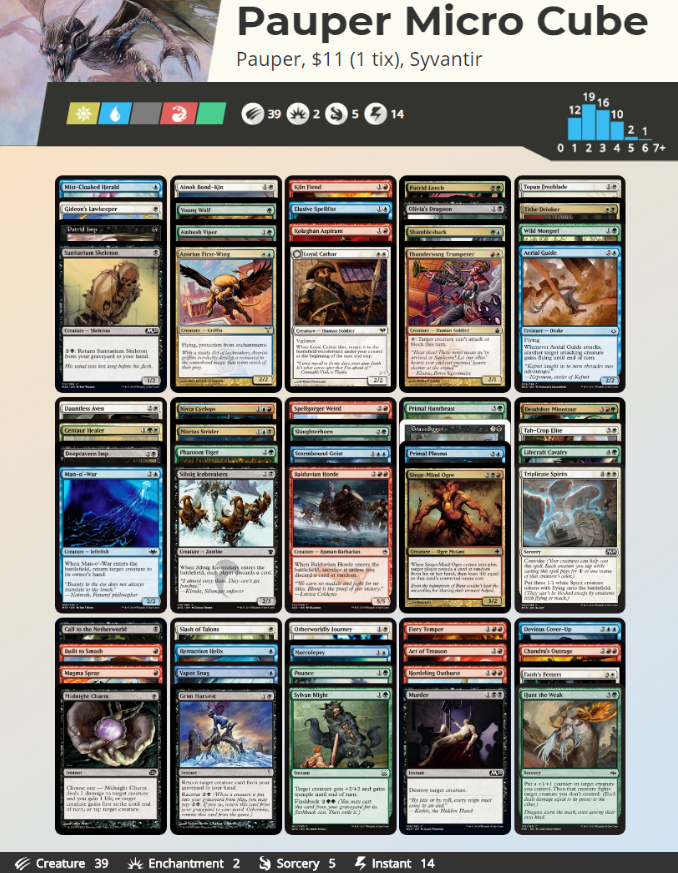
This cube was built using only commons to restrict power level (and cost), with ten cards per color, and one “signpost” gold card per guild to help highlight the synergies and tactics available.
I have some building tips to help with balancing and enjoyment:
- Aim for a minimum 50% creature count, as they’ll be your typical win condition in almost every game;
- Card draw & mill should be minimized as you have no library and can’t lose to decking;
- Combat tricks are extremely powerful and can lead to easy wins;
- Haste is a very “feel-bad” mechanic in this format, and should be carefully considered;
- Modal spells like the Doomfall, Blessed Alliance, or the guild charms are some of the most powerful options available;
- Because you start at 5 life, lifegain is very impactful;
- Counterspells are great, but soft counters like Spell Pierce or Condescend are useless, as each player has infinite mana at all times;
- Make sure that the removal you add can actually kill the creatures you choose;
- Burn spells can be game-breaking, as usually two of them in one hand translates to an auto-win;
- However, adding a few “Instant Win” cards (like Lava Axe) is okay, provided you don’t overdo it.
This is a fantastic time to undertake this project, as you can take as long as you like over it. I had mine completed in two hours (though I still tweak it occasionally), and it can be built using currently unused cards in your collection. If you’re looking for some inspiration, check out the cube in detail below:
Whether you enjoy brewing, designing limited environments, or you’re just naturally attracted to unusual formats like I am, building a Micro Cube is as rewarding as it is fun and easy.
If you think you can take this format and improve upon it, or create a new game using this cube restriction, be sure to tell me your thoughts on Twitter!
Play Paper Magic Online
There’s a phrase that I believe in, possibly more than any other: “restriction breeds creativity.” Creative limitation is a concept that’s used in all walks of life, often to astounding effect. You can see it everywhere in the Magic world, from budget decks to new formats, even metagames shifting in response to a banning can be seen as this philosophy in action.
True to their natural adaptability, people are finding creative ways to maintain social connections and bonds with each other, and their hobbies, in spite of social distancing. I’ve seen home gym setups on Instagram, virtual meeting rooms being used to share a meal or drink with distanced relatives and friends, even using Twitch as a sort of drive-through cinema—watching cheesy old movies with strangers while joking around in chat. It’s this kind of outside thinking that will help us to maintain some form of normalcy in such extraordinary circumstances.
This brings me to the dilemma of paper Magic, more specifically our lack of it currently. As I’ve said already, there’s no real replacement for the tactile sensation and material sounds of shuffling up your favorite stack (and before you ask, MTG ASMR does indeed exist). So how do we get our fix when we’re stuck playing Magic without the Gathering?
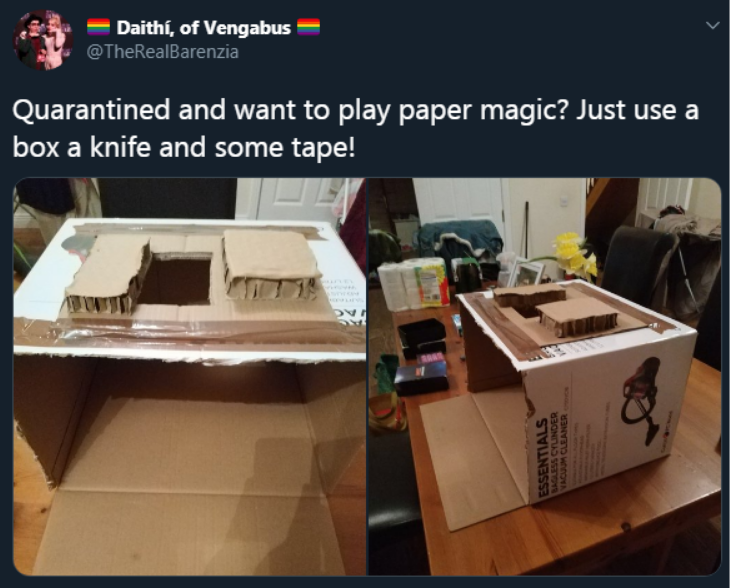
There are a number of video call and conference programs that you can use to keep in touch with friends and family—Discord, Google Hangouts, Whereby, Zoom, and Skype, to name a few. But why use them to show your face, when you can show your board state instead? Never one to let anything stop them from sleeving up, our very own Content Manager Kristen Gregory has compiled a compendium of resources for organizing and setting up paper magic online, whether it’s for a few one-on-one games, or even a full Commander pod. The greatest thing about all the different options available is that even though some of the setups may look janky, they all perform competitively. Hopefully this will help with your card-flicking withdrawal!
If this doesn’t ignite your spark for playing, then I have one more suggestion for you, and it doesn’t require any sort of fancy setup to enjoy.
Try Pauper on Magic Online
Naturally, I’ve been seeing a spike in people trying out Magic Online for the first time over the past few weeks. While it can be a bit clunky and may take some getting used to—I cast Stone Rain on my own land in my first ever game on it—it’s a fantastic platform on which to play Magic. Starting off in Magic Online can be expensive, however, depending on what you end up playing. Some decks in Modern can exceed one thousand Tix (the currency used on the platform, one Tix equates to roughly $1). Even Standard can be in excess of five hundred Tix, depending on the deck. But fret not, there’s one format that allows you to play good games at a great price: Pauper!
The format contains all sets in Magic, but with the restriction that only cards once printed at common may be used. The result of this restriction is that it’s extremely cheap, usually quite fair, but surprisingly powerful! The Urza lands are legal, but so is Brainstorm, Counterspell, and Lightning Bolt, for example. The average tiered Pauper deck price on Magic Online is roughly thirty-eight Tix, with some as low as three.
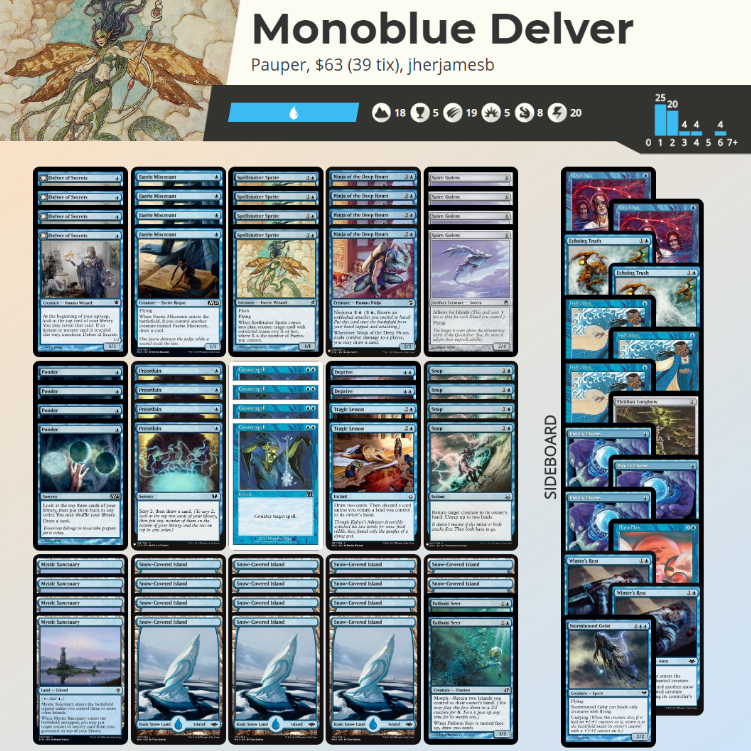
Roughly half of this deck sees regular play in Legacy, and a few cards are even banned in Modern.
It’s a criminally underplayed format with a very close and welcoming community, and one I cannot recommend enough. I hope to write up some guides to the format in the future to help newcomers.
But what if Magic Online isn’t your thing? What if you prefer Arena?
Check Out Magic: Arena
Not to be outdone by Magic Online, Arena is also full to the brim with fantastic formats to satiate your cardboard hunger! Historic is an exciting, digital-only format, somewhere between Standard and Pioneer. Brawl is currently free to enter, and is often the easiest to build decks for due to a reduced need for wildcards. It’s also a blast for when you want to play some games with a little more variance and jankiness. The most notable new addition to try out though is Arena Cube Sealed:
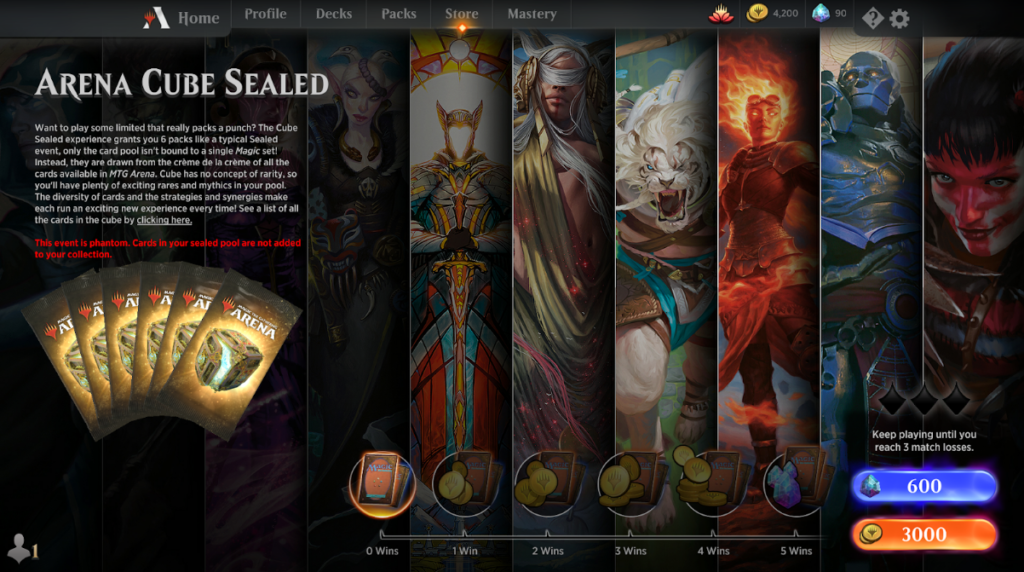
Arena Cube Sealed is a phantom event (you don’t keep the cards you get) that has been carefully curated from the list of cards currently available on Arena. This makes it essentially Historic Cube Sealed, and has countless sweet and popular archetypes to play with. Here’s the Wizards article with the full breakdown of the cube.
Even if none of these formats appeal to you, there’s always Ikoria: Lair of Behemoths to look forward to in the coming weeks!
It might feel like the world is really suffering right now, but that doesn’t mean we can’t make the most of what we have to work with. I hope this list helps you find something to remind you that even though we’re apart, we can still have the Gathering.
And don’t forget to wash your hands!
Scott is an Irish content creator and head of the budget division of the Izzet League. His primary focuses are Pioneer, Modern, and Pauper, and he can be found storming off on Twitch and Youtube.


